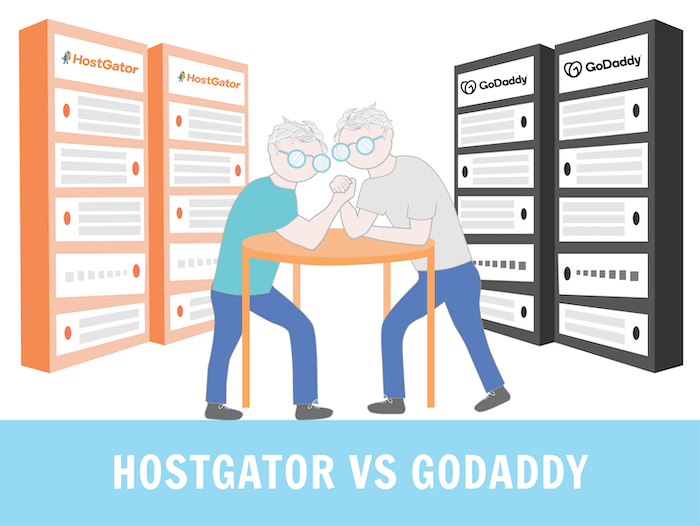Tooltester is supported by readers like yourself. We may earn an affiliate commission when you purchase through our links, which enables us to offer our research for free.
Yes, both GoDaddy and HostGator are very recognizable names in the hosting world. But I also call them mid-tiers, because they’ve tended to disappoint me in the past.
In fact, it’s been pretty tough finding a clear winner between these two, as you’ll read below.
But if you had to choose one only, make sure you read this complete breakdown to see which dealbreakers to avoid!
GoDaddy Vs HostGator: Overview
| GoDaddy | HostGator | |
|---|---|---|
| Popularity | Very popular | Popular |
| Ease of Use | Okay | OKish |
| Storage | Good | Excellent |
| Bandwidth | Good | Excellent |
| Backups | Poor | Poor |
| Domains, subdomains and parked domains | Ok | Ok |
| Email accounts | Ok | Good |
| FTP, SFTP, SSH Access and Git | Good | Good |
| SSL & HTTP/2 | Bad | OK |
| WordPress Integration | Poor | Poor |
| Server locations | Good | Poor |
| Page Speed | Good | Bad |
| Uptime | OK | Good |
| Security | Okay | Good |
| Scalability | Excellent | Excellent |
| Support | OKish | Bad |
| Pricing | Affordable | Affordable |
| Final score | 9 | 9 |
| More Information | www.GoDaddy.com | www.HostGator.com |
Popularity and Company Info
GoDaddy is what some specialists refer to as a “mega technology” because they power some 50+M websites worldwide. This isn’t all web hosting though. The number also accounts for their website builder and domain-name buying service. There are dozens of services that the company offers, which help with their popularity – and as we’ll see with scalability options.
But let’s not forget about HostGator, who’s also a fairly famous name in the website hosting world, with close to a million customers worldwide.
They were acquired by EIG (Endurance International Group), and if you’ve spent any time on our site, you may already know this raises some red flags.
Yes, sadly, EIG web hosting companies have a pretty poor reputation and tend to lure newbies with catchy low prices for the first 12 months, but poor support and constant upsells. See our Bluehost review and iPage review for further evidence of this!
Now do the shortcomings of EIG make it worth discarding HostGator straight away? Maybe not…
Ease of Use
Signing up with both services is straightforward. And GoDaddy makes good use of cPanel, the industry standard, for some, for managing a web hosting dashboard. It looks a little bit dated in my opinion but doesn’t impact the ease of use.
Do note that I find the general GoDaddy interface to be slightly confusing at times. Here’s an example, with x3 buttons that aren’t super clear:

HostGator’s cPanel is very similar to GoDaddy’s. There is one big difference, and it’s a pet peeve of mine: the constant upsells and adverts for paid add-ons. It sometimes feels like using a freemium app, where every button leads you towards an in-app purchase. Not cool.
Winner: I’m going to give GoDaddy this point, simply because it’s way more subtle about trying to sell me extra services I don’t want or need, although they do too.
Hosting Features
Now that we’re logged in, let’s see what we get in terms of features.
Storage
GoDaddy offers SSD storage on all its plans, and it’s generous but limited to 25 GB, 50 GB, 75 GB or 100 GB depending on what plan you pick. Its plans also limit the number of sites that you can host with them (to 1, 10, 25 or 50).
HostGator sells itself on its completely unlimited plans, which means you get unlimited storage on all plans.
Note that there is a limit to the number of files you can have. It’s called inodes in web-hosting jargon, but don’t worry too much: with HostGator, the limit is 250,000 files, which is a lot indeed. With GoDaddy, it’s also 250.000.
Winner: I’d say HostGator can have this point, as GoDaddy has more limitations.
Bandwidth
Here again, it’s important to read the small print. GoDaddy claims to offer unmetered bandwidth, but the fact is that they could give you a warning if you abuse their policy. The amount needed to trigger a red flag is unspecified.
To be fair, I wouldn’t worry a ton, as it’s mostly to block file-hosting websites, but I still can’t help but feel a little bit lied to.

Now with HostGator, I’ve double-checked all the T&Cs, and bandwidth appears to be completely unlimited. Good on them!
Winner: There is an unspecified (and I suspect very large) limit for GoDaddy bandwidth and HostGator is fully unlimited. It’s a tie.
Backups
Things start looking a bit worrying when you explore the backing up a website options with both GoDaddy and HostGator.
With GoDaddy, you’ll need to purchase an add-on at $2.99 (at renewal) a month to benefit from daily backups and one-click restore, which should really come bundled with your plan.

GoDaddy backup addon
HostGator isn’t much better, only giving you one backup per week. Their add-on for daily backups starts at around $30 a year, which works out similar to GoDaddy.
Winner: Neither of them should get a point here, as the daily backups are only available as paid add-ons. I would suggest you check out DreamHost and SiteGround if you need more decent backup options.
Domains, Subdomains & Parked Domains
For most people, GoDaddy is first and foremost a place to buy domain names. So it’s no surprise that you have options there, but that they also don’t want to cannibalize their own services.
So yes, you do get a free domain for one year on all plans, but they renew (.com domain names) at $17.99 thereafter.
In terms of subdomains and parked domains, it’s all unlimited with the Deluxe, Ultimate and Maximum GoDaddy plans.

HostGator gives you one free year too. The price shoots to the same unattractive $17.99 as GoDaddy after the first 12 months, so I’d definitely recommend looking elsewhere.
Winner: neither, to be honest, so it’s a tie, but I’d recommend looking at NameCheap if you get the chance.
Email Accounts
GoDaddy lets you read and send emails via their cPanel email system, but they also bundle 1 professional Microsoft Office 365 email account for one year on all plans. It costs $23.88 a year when you renew, which is actually much cheaper than using G Suite, for instance.

GoDaddy cPanel emails
With HostGator, you get unlimited email accounts, and unlimited storage to keep them. The only cap is on the number of emails you can send per hour (500) so do keep that in mind if you want to send large newsletters.
Winner: Both offers are quite different, but I think HostGator gets this point as they are less pushy with the email add-ons.
FTP, SFTP, SSH Access, and Git
Nothing to complain about here, as you can create unlimited FTP accounts both with GoDaddy and HostGator. Both also support SFTP and SSH.
Winner: it’s a tie here, although note that neither provider lets you work with Git repositories out-of-the-box.
SSL & HTTP/2
For the best browsing security and SEO purposes, it’s important to ensure you can enable SSL certificates and the latest HTTP/2.
Most providers offer you the certificate for free as part of your plan, and GoDaddy does too, but only for the Ultimate and Maximum plan. With Deluxe, it’s free for one year then $69.99 thereafter. It’s probably one of the stingiest providers in that respect.
HostGator offers SSL with all their plans, but they’ve not updated to HTTP/2 at the time of writing, which may not be ideal for some.
Winner: you get better SSL options with HostGator, but no HTTP/2. They should still take the point over GoDaddy.
WordPress Integration
One thing to mention here: both HostGator and GoDaddy have dedicated WordPress hosting plans. They are different from the ones we’re comparing here, with different pricing and features.
| WordPress hosting plans | GoDaddy | HostGator |
|---|---|---|
| Entry plan | Around $10 a month. 1 website, 30GB storage. Free email and domain for 1 year. 75K visitors | Around $12 a month.1 website, 100K visits, 1GB backup. |
| Mid-tier | $15 a month. Same as above + 75GB storage, 100K visitors. | Around $21 a month. 2 sites, 200K visitors a month, 2GB backups. |
| High tier | $20 a month. Same as above + unlimited storage and visitors | Around $25 a month.2 sites, 500K visits a month, 3GB backup. |
| eCommerce | $25 a month. Same as above + no WooCommerce fees and free WooCommerce plugins. | N/A |
Interestingly, there is a 99.9% uptime guarantee for HostGator’s WordPress hosting (more info on uptime below).
I must say that these WordPress-focused plans that HostGator and GoDaddy offer, don’t seem to have many advanced WordPress features like staging areas to test new code, and speed optimization tools for WordPress. Check SiteGround and A2 Hosting if you need these.
Now you can, of course, install a WordPress site on your hosting account, it’s fairly easy with the popular one-click installation option, even with the shared plans. But neither HostGator nor GoDaddy shared hosting plans have further specific features for WordPress.
Winner: you can absolutely install WordPress on GoDaddy and HostGator shared hosting plans, but they won’t help you much with it.
Server Locations
Let’s now see where your website data will be hosted. It’s not information that’s always publicly disclosed, but very useful to know if you target a specific audience.
In fact, GoDaddy doesn’t publicly say it, but they do have from 9 locations worldwide, including their massive 270,000 ft Phoenix data center. Others include Asia and Europe.
All of HostGator’s servers, however, are in North America, namely Texas and Utah.
Winner: GoDaddy covers way more ground - important if you have an audience that comes outside North America.
Page Speed
We’ve performed extensive web host speed tests here at Tooltester for several years, and neither HostGator nor GoDaddy have ever performed terribly well. In fact, they have both always been very close to the bottom when talking speed.
However, the chart below shows this years speed tests results, and you can see that while Hostgator remains rooted to the bottom (with an average page load time of 2.72 seconds), GoDaddy is the third fastest, (with an average page load time of just 1.44 seconds).

As you can seen in the speed test results over the last three years, while GoDaddy has never been as poor as HostGator, this years good results are unprecedented. Let’s hope they can keep it up!
| 2020 | 2021 | 2022 | |
|---|---|---|---|
| Page Load Time in Seconds | |||
| GreenGeeks | 2.39 | 1.56 | 1.29 |
| A2 Hosting | 3.15 | 2.01 | 1.30 |
| GoDaddy | 3.40 | 1.94 | 1.44 |
| Cloudways | 2.32 | 1.73 | 1.46 |
| SiteGround | 2.14 | 1.54 | 1.56 |
| Hostinger | 4.19 | 1.61 | 1.63 |
| WP Engine | 2.21 | 1.65 | 1.66 |
| Namecheap | - | 1.60 | 1.69 |
| Dreamhost | 3.28 | 1.84 | 1.75 |
| Kinsta | 2.98 | 1.77 | 1.82 |
| Bluehost | 3.07 | 2.87 | 2.07 |
| IONOS | - | 1.95 | 2.32 |
| InMotion | 4.36 | 2.75 | 2.58 |
| iPage | 4.19 | 2.76 | 2.60 |
| HostGator | 3.77 | 2.78 | 2.72 |
Results in seconds
Poor website loading times may affect negatively your SEO and user experience.
An although there are other things you can do to fix a slow website and make WordPress faster, your web host plays a big part in this.
So slow speeds from either HostGator and GoDaddy are a serious issue!
Winner: GoDaddy performed muh better, but given their poor results in previous years, I’m a little bit skeptical about whether they will continue to perform like this. More consistently fast providers include SiteGround and GreenGeeks.
Uptime
Uptime, which measures how often your site is live during a year, is also an important metric. You don’t want your users to be unable to access your site at any point. In theory, you want a 100% rate, but that would be expensive, so most sites can settle at 99.95%.
You can see the results of our latest uptime tests in the cart below:

GoDaddy, according to our tests, was only online for 99.95% of the site, which isn’t great. HostGator performed better, with a 99.98% rate.
These results are pretty consitent with their respective performances over the last three years:
| 2020 | 2021 | 2022 | |
|---|---|---|---|
| Uptime % | |||
| SiteGround | 99.97 | 100 | 100 |
| WP Engine | 99.99 | 99.99 | 100 |
| Namecheap | - | 100 | 100 |
| Kinsta | 100 | 100 | 100 |
| InMotion | 99.73 | 99.95 | 100 |
| A2 Hosting | 99.99 | 99.98 | 99.99 |
| Cloudways | 100 | 100 | 99.99 |
| HostGator | 99.91 | 99.99 | 99.98 |
| GreenGeeks | 99.98 | 99.98 | 99.97 |
| GoDaddy | 99.90 | 99.96 | 99.95 |
| Hostinger | 99.48 | 99.92 | 99.95 |
| Bluehost | 99.96 | 99.99 | 99.95 |
| iPage | 98.45 | 99.85 | 99.95 |
| Dreamhost | 99.99 | 99.96 | 99.83 |
| IONOS | - | 99.93 | 99.71 |
Winner: HostGator take the point.
Site Migration
Migrating files to a new site is fairly technical, which is why many providers offer to charge you for doing it themselves.
This is exactly what GoDaddy does, and the price is undisclosed. HostGator does offer one free migration, but it’s also a paid extra after that (note that either provider can’t do it from sites created with website builders like Wix, Weebly or Squarespace site).
Additionally, unlike other providers (e.g. DreamHost or SiteGround), GoDaddy and HostGator don’t seem to offer a tool (e.g. WordPress plugin) to let you automatically migrate your sites.
Winner: it’s a tie.
Security
This is an area where we often see providers attempting to upsell their services. It’s really hard to test a security add-on (because that would mean we know how to attack a site in the first place). It’s probably easier to think of it as a kind of insurance. And with GoDaddy, it costs between $16-25 a month, depending on the level of coverage.

With HostGator, you get a file scan (to look for malware) which costs $2.50 a month extra, courtesy of SiteLock.
I’ve already covered PHP7 (available with both GoDaddy and HostGator – don’t forget to update your PHP version with HostGator). SSH and SSL also come de-facto installed.
Winner: Additional security features are paid extras with both GoDaddy and HostGator. It’s a tie.
Scalability
While I’ve only based this comparison on shared hosting plans, they are by no means the only ones you can purchase with GoDaddy and HostGator. I’ve already mentioned the WordPress hosting plans, but let’s take a look at all the alternatives.
Both GoDaddy and HostGator offer VPS hosting. At GoDaddy’s, it costs between $4.99 and $61.99 a month depending on how much RAM you want and how many CPUs are in use. I should warn you that it’s a lot of info to take into account, so it’s probably best to head to our GoDaddy pricing page for all the details.
With HostGator, it costs between $29.95 to $119.95 a month, also depending on the number of CPUs, disk space, and bandwidth.
Both GoDaddy and HostGator also offer dedicated hosting, and even the option to choose between Windows and Linux servers. It’s a pretty rare occurrence as far as I know, and in fact, it could be a good reason to compare these two versus other solutions on the market.
Things start getting harder to compare when you look at Hostgator’s Cloud Hosting plan ($11 -19.99 a month depending on CPU cores and RAM) because GoDaddy doesn’t have the option.
However, GoDaddy does have dedicated hosting plans, the priciest of the bunch, costing between $129.99 to $399.99 a month depending on the processing power you need.
Winner: Both providers have a good range of other products to choose from here.
Support
One of the advantages of GoDaddy support is that they have a lot of local phone numbers you can call, wherever you are in the world.
The phone lines are open 24/7. They also have a (somewhat hidden) live chat button on their site, and a good knowledge base with community forums.
When I contacted them, the answers were okish and came at a reasonable pace. I wasn’t wowed or anything, but it was not too bad.

HostGator support example
HostGator, on the other hand, is plagued by the poor support most EIG companies tend to deliver. My questions seemed to confuse them to no ends, and to add insult to injury, they often came really slowly.
Winner: GoDaddy isn’t the best, but it still wins because HostGator support is so abysmal.
Pricing
So now the million-dollar question: how much does it cost to host your site with these two providers? As aforementioned, the answer is pretty complicated with GoDaddy because they have so many options, so do check out our pricing page.
But here is how I would organize it in a comparison table:
| Entry plan | Middle plan | Higher plan | Advanced plan | More information | |
|---|---|---|---|---|---|
| GoDaddy | $8.99 | $11.99 | $16.99 | $24.99 | Visit GoDaddy |
| Hostgator | Hatchling – $8.95 | Baby – $11.95 | Business – $16.95 | N/A | Visit HostGator |
Note: Bear in mind that unless you have the top-tier hosting plan with GoDaddy, you’ll also need to pay for your SSL certificate, add that to the monthly cost.
A few things to note:
- The prices listed here are after the renewal of your first 12-month contract
- Prices are paid annually
- HostGator is the only provider I know that has very flexible terms (1 month, 3, 6, 12, 24, and 36)
Winner: HostGator is more affordable overall, but you have fewer options.
GoDaddy Vs HostGator - Final Thoughts
I would put both GoDaddy and HostGator in a very similar category of website hosts. They’re affordable, with decent features, and serious shortcomings.
This makes it very difficult to choose a clear winner between these two based on the breakdown above.
I think a better way to look at it would be to choose GoDaddy if:
- You want the better performance (but not the best)
- You want to jump on one of their many other plans in the future
However, HostGator could be worth it if:
- Affordability is more important to you than features
- You want a short-term contract
When it comes to points, we had a tie as both tools got 9 rounds. But to be honest, there were several crucial areas where both failed – for example, GoDaddy and HostGator should offer better performance and backup options.
Now, I would be hard-pressed to really recommend either of these two to a friend. This is why I’d suggest you continue your research with our SiteGround Vs HostGator comparison here, as well as the BlueHost Vs GoDaddy post here. Generally speaking, A2 Hosting, DreamHost and GreenGeeks offer similar services with better performance and even cheaper fees.
We keep our content up to date
15 Mar 2022 – GoDaddy plans changes
13 Sep 2021 – New performance tests
04 Mar 2021 – First publication
THE BEHIND THE SCENES OF THIS BLOG
This article has been written and researched following a precise methodology.
Our methodology




